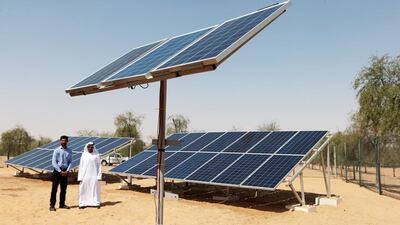ABU DHABI // Nasser Al Mansoori and Ali Al Taee want to make the country’s farms greener by swapping diesel generators for solar power.
Most farms use diesel-powered pumps to extract the groundwater that is used to irrigate crops and trees.
It is noisy, dirty and expensive, with farms paying up to Dh80,000 a year to fuel one generator.
The Emirati engineers have installed 28 solar panels, which generate 8.5 kilowatts of electricity, to irrigate a small section of the Khub Al Dhas forest in the Western Region.
“The idea behind this project was to promote sustainability solutions,” said Mr Al Mansoori who is engineering and development manager at Handasa, a green energy company in Masdar City.
“We want to highlight use of solar energy in farms’ daily operations because we believe that solar energy is the future of our country.
“The sustainable solar-propelled water pumping system will cut the operation costs by up to 60 per cent a year as compared to traditional generators.”
Mr Al Mansoori said that the system paid for itself within two years.
The vast Khub Al Dhas forest near Madinat Zayed is managed by the Environment Agency Abu Dhabi.
The solar system took about six months to develop and install and is monitored remotely from the agency’s offices.
It is hoped it will eventually replace the diesel-powered pumps that provide water for some of the thousands of the ghaf trees.
“We are going to expand this environment friendly project around the country as much as we can,” said Mr Al Mansoori.
“We are also in talks with other government entities.”
Wafa Al Yamani, researcher in water management at the agency, said preliminary results of the project were positive and met Ead’s requirements.
“We seek to embrace new innovations to achieve sustainability in the use of water resources in the agriculture sector, as well as to support young Emiratis to continue research and development,” Ms Al Yamani said.
“The Ead team will continue to evaluate the project and put their recommendations by the end of this year.”
Ead manages 73 date palm farms across the emirate – 55 of which are in Al Gharbia – and these contain 361,584 palm trees.
The Western Region Municipality has also showed interest in using the technology in farms and forests.
anwar@thenational.ae

